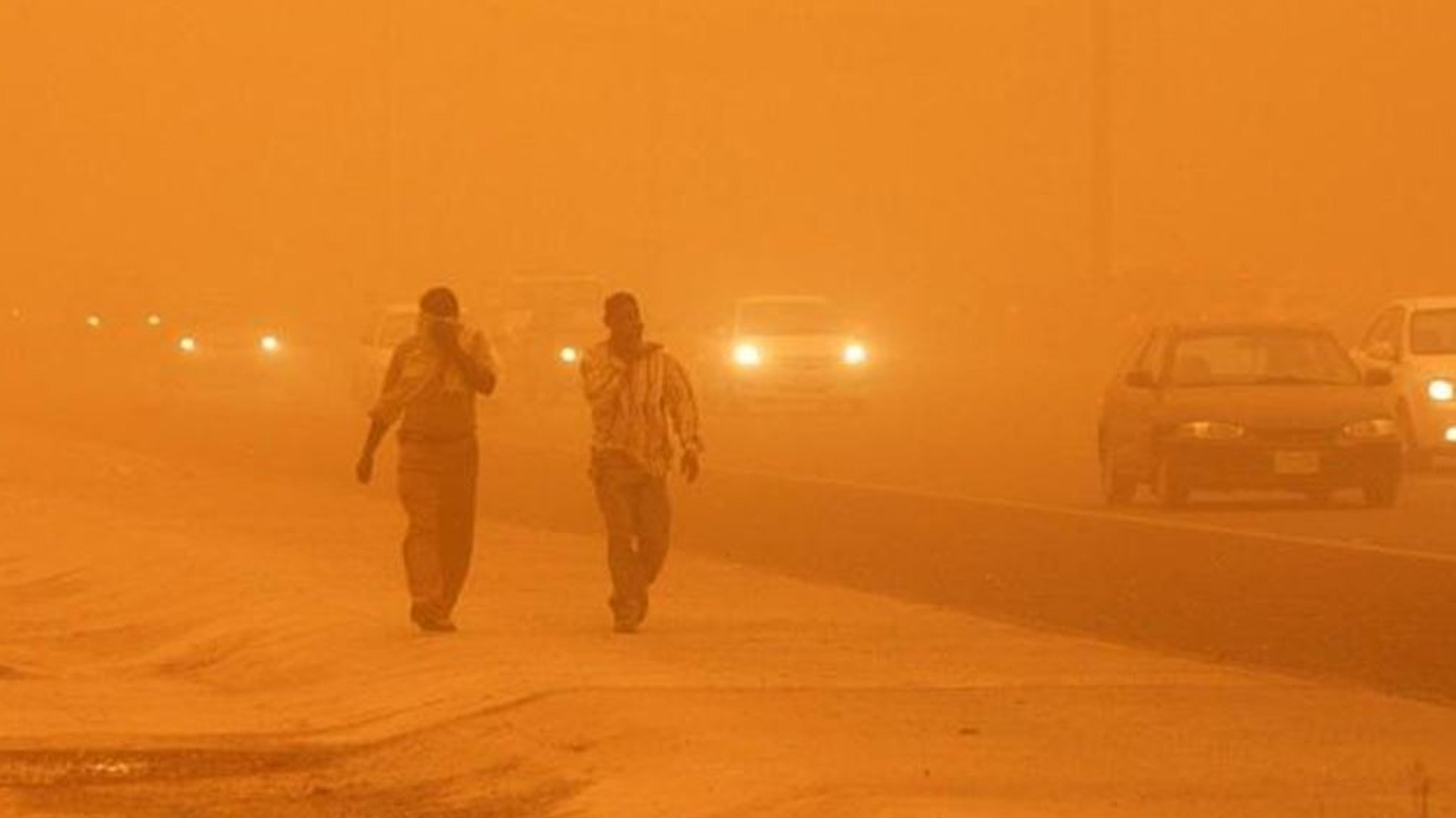Dust Storm Sweeps Anbar as Dense Fog Blankets Basra in Worsening Weather Conditions Across Iraq
A dust storm swept Anbar while dense fog blanketed Basra, reducing visibility and disrupting travel. The events occur amid a Green Iraq Observatory report blaming federal inaction on unlicensed factories for Baghdad's dangerous pollution levels.

ERBIL (Kurdistan24) – A dense wave of dust sweeping in from the Syrian border engulfed wide areas of western Iraq on Thursday, striking several districts of Anbar province and expected to reach the provincial capital, Ramadi. At the same time, a thick wave of dense fog has settled over Basra in Iraq’s far south, sharply reducing visibility and disrupting traffic across multiple areas.
Residents in western Anbar told Kurdistan24 that the dust storm intensified early Thursday, with skies darkening and visibility dropping to dangerous levels. Iraqi media outlets and social networks circulated images showing the storm's heavy concentration, prompting authorities to warn drivers to reduce speed and exercise extreme caution due to the elevated risk of traffic accidents.
The Anbar Traffic Police issued an alert urging motorists on external highways to drive carefully, avoid sudden maneuvers, and keep headlights on, noting that the storm could thicken further in the coming hours.
In contrast to Anbar’s dust storm, Basra faced a different hazard: a dense, moisture-heavy fog that settled over large parts of the province, causing visibility in some districts to drop to between 500 and 1,000 meters.
The fog obstructed vision on major roads, with residents reporting unusually thick conditions as early as dawn. Authorities urged the public to avoid unnecessary travel until visibility improved.
Amer Jabri, spokesperson for Iraq’s Meteorological Authority, confirmed that the fog blanketing Basra is considered “a normal case” for this period, adding that weather conditions are expected to gradually stabilize. As winds shift, visibility is projected to return to five kilometers or more.
The latest atmospheric conditions come as environmental concerns surge across Iraq — intensified by a new report from the Green Iraq Observatory, which placed full responsibility for Baghdad’s deteriorating air quality on the federal government.
The observatory issued a stark assessment, noting that the capital’s worsening pollution crisis stems largely from the state’s failure to shut down hundreds of unlicensed factories and its continued tolerance of garbage burning. These unregulated brick and asphalt factories, many of which operate on heavily polluting fuels, release dense clouds of toxic emissions into residential areas daily.
Despite repeated promises from federal authorities to prosecute violators, the report stated that “none of these commitments were implemented,” allowing pollution sources to operate unchecked. International air-quality data from IQ Air consistently rank Baghdad among the most polluted cities in the world.
The report also warned that without swift and serious action, pollution in the capital will intensify even further in the coming days and weeks.
Kurdistan Region Taking Decisive Environmental Measures
The Kurdistan Regional Government (KRG) is implementing a multi-layered environmental strategy aimed at modernizing air-quality monitoring, eliminating major sources of pollution, and enforcing regulations on industrial operations.
On August 19, 2025, the governor of Erbil announced the installation of five advanced climate-monitoring stations across the city, enabling precise tracking of pollution levels and rapid responses to environmental threats.
The KRG has also significantly reduced emissions by expanding the Runaki electricity project, which provides 24-hour power to most urban areas. The project allowed for the removal of more than 1,260 private diesel generators, long considered some of the region’s most harmful polluters. Their removal has sharply cut both noise and air pollution.
The government has additionally shut down dozens of unlicensed oil refineries, following a decree ordering the closure of 138 illegal facilities around Erbil. These refineries had been major contributors to toxic emissions and environmental degradation.
As Baghdad continues to grapple with widespread pollution and weak environmental enforcement, the Kurdistan Region is taking proactive steps that highlight a widening governance gap between the two administrations.
While dust storms like those in Anbar and fog conditions like those in Basra are seasonal phenomena, experts warn that mismanagement, unregulated industry, and poor land stewardship are worsening their frequency and impact.
The divergent environmental strategies of Baghdad and Erbil present two contrasting paths for Iraq’s future — one shaped by neglect, the other by active intervention.
As a dust storm sweeps across the western desert and dense fog blankets the southern coastline, the broader question for Iraq remains:
Will the country address its environmental challenges with decisive action, or continue on a path where crises become routine?